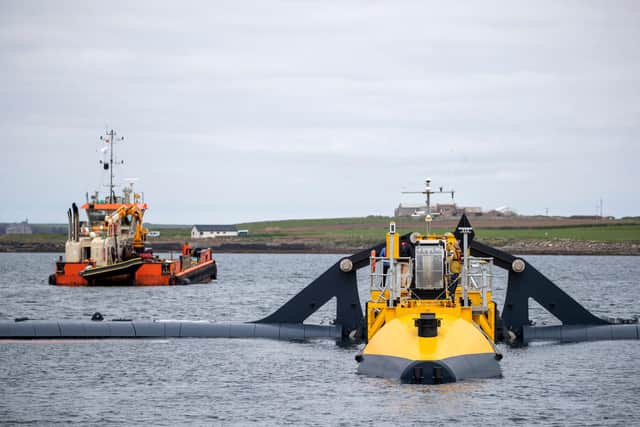Cop26 climate change summit: Scotland can show the world how to build a carbon-free economy – Pete Wishart MP
With just two months until the United Nations’ Cop26 climate change conference in Glasgow, it’s been an excellent opportunity to highlight the offering of the Scottish renewable energy sector, and what can be done to ensure that it continues to accelerate.
What we have found is a sector preparing for a renewable renaissance and positively looking at a future less reliant on carbon.
Advertisement
Hide AdAdvertisement
Hide AdAlready enormous progress has been made. In 2020, 97 per cent of our electricity in Scotland was generated by renewables – the equivalent to powering all households in Scotland for almost three-and-a-half years, and up seven per cent from 2019. While this is indeed good news, many difficulties have also been identified.
One of the main pinch points scuppering further progress is around transmission charges. These charges, set by energy regulator Ofgem, are paid by developers to transmit their electricity to customers.
While some renewable energy projects in Wales and England are paid to connect to the electricity grid, unfortunately all Scottish projects must pay to connect to the grid.
This creates an unfair advantage elsewhere in the UK and deters investors supporting projects north of the Border. Scotland has enormous strengths in skilled engineers who can transition from oil and gas and great potential for tidal and wind energy, and it would be a travesty if we cannot make the most of this potential.


We need fairness throughout the UK if we are to meet the ambitious net-zero carbon emission targets of both the Scottish and UK governments.
Net zero is a long-term aim, and certainly one that will not be achieved overnight, within a month or a year. That is why it is surprising, and detrimental to the sector, that transmission charges can vary year on year and are subject to annual review.
This is problematic for any business case and the securing of long-term, private sector funding. We have today called on Ofgem to ensure net zero underpins its work, and ensure that the charges and systems it has in place work to achieve the long-term transition to a low-carbon and renewable energy sector.
Aside from transmission charges themselves, we need to make sure that our electricity grid is fit for the 21st century nature of renewable energy.
Advertisement
Hide AdAdvertisement
Hide AdAs our economy becomes increasingly reliant on the electricity grid for powering our cars and heating our homes, the grid will experience extraordinary pressure.
So as to avoid the grid buckling under the pressure of net zero, it is imperative that an urgent review take place by the end of 2022 so any changes can be made in ample time to meet the Scottish government’s target to be net zero by 2045.
Part of creating an electricity grid fit for the future is making sure it can support new and emerging energy sources.
With extensive coastlines offering choppy seas, Scotland has enormous potential to champion tidal energy production.
In June the Scottish Affairs Committee visited the European Marine Energy Centre in Orkney, the only accredited wave and tidal test centre for renewable energy in the world, and it was extraordinary.
However, unlike other renewables such as offshore wind, tidal and marine projects have previously been unable to bid into the Contracts for Difference scheme which would see the government financially support such projects.
It was therefore welcome news earlier this week that the government is including tidal energy in the upcoming round of the Contracts for Difference scheme. This investment must be sustained to make the most of this potential.
Making sure tidal and marine energy projects succeed could significantly benefit the UK as a renewable powerhouse, while supporting jobs and local economies. In Orkney, we heard how a tidal turbine, Orbital O2, had parts from the south coast, Wales, north of England and in Scotland. The turbine may be seen to be operating in Orkney, but its development is down to clusters throughout the UK.
Advertisement
Hide AdAdvertisement
Hide AdAt numerous points during the inquiry, we heard that the green energy transition is creating many thousands of jobs. Scottish Renewables told us that it is identifying which skills can cross over from the current oil and gas workforce. Even the Green Jobs Taskforce report stated in July that many of the potential skills gaps for offshore wind could be addressed by those working in the oil and gas sectors.
It is critical that any necessary reskilling is done quickly and effectively to avoid holding up progress for the renewables sector, and to ensure a seamless transition for those whose jobs are likely to be impacted.
The UK must reduce emissions by 78 per cent by 2035 compared to 1990 levels and, thankfully, Scotland has the toolbox to achieve it. But it won’t be easy, and the UK government, working with the Scottish government, must ensure a just transition towards the green jobs and real tangible policy levers that can allow renewable energy to grow further.
There is no better time than now to address these points as we prepare to host the Cop26 summit. We must showcase the opportunities available to the people of Scotland, and we can show world leaders that the low-carbon transition can create jobs, support local economies and bolster livelihoods.
Pete Wishart is the chair of the House of Commons’ Scottish Affairs Committee and SNP MP for Perth and North Perthshire
A message from the Editor:
Thank you for reading this article. We're more reliant on your support than ever as the shift in consumer habits brought about by coronavirus impacts our advertisers.
If you haven't already, please consider supporting our trusted, fact-checked journalism by taking out a digital subscription.
Comments
Want to join the conversation? Please or to comment on this article.
